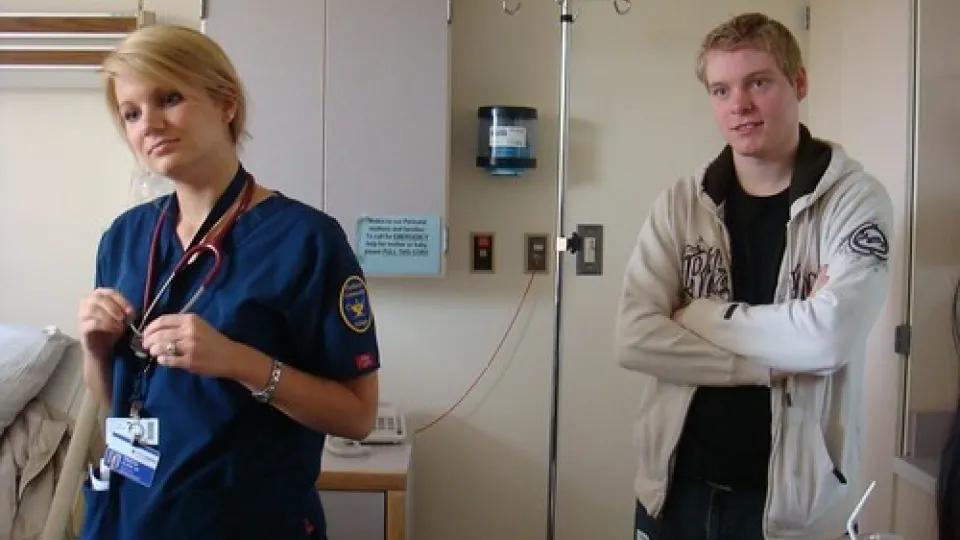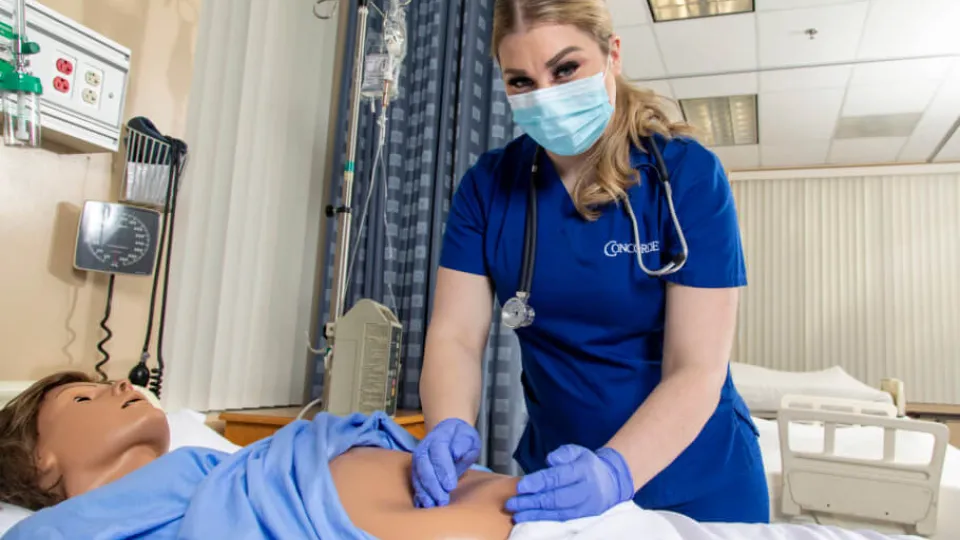
Nursing is a challenging career, but it's also a rewarding choice. Nurses make up the largest portion of the health care workforce and are the primary care providers in hospitals and most of the nation's long-term care facilities. [11]
If you're thinking about a nursing career, it's essential to consider the skills and qualifications necessary for this job. While you'll learn a great deal in nursing school, you may already possess some character traits that will help you excel as a nurse.
If you have the following characteristics, you'll find that you're well-positioned for a successful nursing career even before you begin training. These personal traits make you an ideal candidate for a career in nursing. You'll also find that you can easily shore up areas where you may need more improvement with self-awareness and personal effort.
Kindness
The ability to demonstrate kindness, empathy, respect, and caring toward patients is so essential that it receives an entire section of the National Council Licensure Exam (NCLEX), an exam that you must pass when you complete nursing school. The Psychosocial Integrity section of the exam focuses on how a Licensed Practical Nurse (LPN) or Licensed Vocational Nurse (LVN) can support patients' mental health, social awareness, and emotional well-being. [1] Well-rounded LVN, LPN, and RN programs will cover cultural awareness, mental health topics, and end-of-life concepts.
While you can acquire a great deal of information through classwork, the most successful nurses are often those who naturally present an attitude of kindness and caring. If friends and family describe you as a deeply compassionate or empathetic individual, you may be an excellent fit for a career in nursing. Demonstrating that you genuinely care about a patient will have a monumental difference in how patients feel about their care.
A Wakefield Research for Dignity Health survey revealed that 87% of Americans feel that compassionate treatment is the most significant consideration when choosing a health care provider. An overwhelming 90% of Americans would consider switching to another health care provider if they received unkind treatment, and 72% would be willing to pay more for a physician who emphasized kindness when treating patients. [2]
Nurses need to demonstrate kindness toward their patients. Those who naturally exhibit compassion, respect, empathy, and a good sense of humor throughout their daily lives will likely find it easier to draw on these characteristics in their nursing careers. While you need to separate your concerns from your professional career, you don't necessarily need to leave all your emotions at the door when you're working with your patients. Some ways that you can exhibit the characteristic of kindness in nursing include the following: [3]
- Acknowledging your patient's fears, vulnerabilities, and concerns.
- Showing an interest in your patient beyond the limited scope of the illness or injury you are currently addressing.
- Giving the patient time to respond to your questions and information.
- Paying attention to the patient's thoughts and feelings rather than physical health alone.
Related: Navigating the Path To Becoming an RN: Educational Pathways and Licensure Requirements
Communication
Good communicators make ideal candidates for careers in nursing. You'll find that your communication skills have ample opportunities to shine in LPN and LVN programs. One of your primary roles as an LPN or LVN is to communicate effectively with patients and their families and your fellow nurses, physicians, and other health care providers.
Communication is more than conveying information to others. It also involves active listening skills. When you're actively listening to someone, the individual can tell that you're paying attention because you're supplying both verbal and nonverbal cues, such as making eye contact, nodding, and providing feedback. When you're listening to your patients, you may need to interpret both their words and their body language. Nonverbal cues from the patient or patient's family can give you a wealth of information you can easily overlook if you're not paying attention.
When you're sharing information, your communication skills need to include speaking clearly and maintaining a calm yet assertive manner. Assertiveness will help you support honest and forthright communication when dealing with critical issues such as patient advocacy. An assertive manner will give your patients confidence in your capabilities while appropriately conveying gravitas in your message to supervisors.
As a nurse, one of the vital communication skills that you will learn is tailoring your word use to your audience. You can use complex clinical language when speaking to other health care providers, such as registered nurses and physicians. In contrast, you'll need to switch to more understandable language with patients and their families.
Some ways that you can demonstrate your communication abilities in your nursing career include the following: [4]
- Practicing situational awareness and adjusting your communication based on the situation.
- Looking up from documentation to focus on the patients when they're speaking.
- Sharing information slowly so that you don't overwhelm patients.
- Asking patients to repeat back information in their own words to verify understanding.
- Restating patients' concerns to confirm that you understand what they're saying.
Resourcefulness
Resourcefulness is a characteristic that will serve you both in nursing programs and throughout your career. Individuals who are resourceful practice critical thinking and problem solving more easily. They're able to quickly overcome difficulties and find innovative ways to deal with unexpected situations. These types of challenging situations can frequently occur when you're a nurse. However, if you're naturally resourceful, you'll approach such circumstances with an open mind, confident self-assurance, and a hopeful, proactive mindset.[5]
As a nurse, you'll find that you're continually learning new topics. LPNs and LVNs in almost all areas must complete continuing education units (CEUs) to renew their licenses in nearly all health care areas. [6] Those who are naturally resourceful are more likely to take an enthusiastic approach to these courses. They add to the arsenal of skills and knowledge that an individual can draw on during one's daily nursing activities.
Becoming set in your ways is not useful if you're a nurse. You'll find that you need to continually adapt to the patients and situations you're working with. No two individuals are ever the same, even if they have similar conditions. Strong critical thinking skills are essential to help nurses identify the best course of action in a given situation. If you're accustomed to acting resourceful, you'll likely find it easier to practice the necessary problem solving for a nursing career.
You can use the characteristic of resourcefulness in your nursing career by: [7]
- Regularly adopting new behaviors as suited to individual patients.
- Evaluating your performance and actively seeking ways to improve.
- Proactively seeking out further information to improve efficiency, patient satisfaction, or outcomes.
Versatility
Versatility is something that draws many people toward a potential career in nursing. The field itself is incredibly diverse, offering a wealth of nursing career options even within the scope of a single title, such as LPN or registered nurse. Nursing programs prepare you for a range of professional situations.
As a nurse, you can work in diverse environments that include nursing homes, hospitals, correctional facilities, rehabilitation centers, and physicians' offices. You can also work as a nurse in the military, taking your competencies out to the battlefield. Suppose you're especially fond of experiencing different environments. In that case, you could pursue a career as a travel nurse, moving from one hospital system to another, providing assistance as needed in locations across the country.
Versatility is a characteristic that nurses should have themselves as well. Versatility is the ability to turn easily from one task or endeavor to another. Naturally versatile individuals typically explore a variety of activities and disciplines. Suppose you were a member of several extracurricular activities or took a range of diverse high school classes. You likely have the versatility and flexibility necessary to succeed as a nurse. This versatility will often equip you with a great degree of open-mindedness as well and make it easier to relate to patients from diverse backgrounds.
Versatility is something that will serve you well in any workplace. While there is value in becoming an expert at one particular task, versatility means you can fill various needs as they arise. While you may be exceptionally skilled at starting IVs, this skill isn't something that's always needed. Your versatility equips you to successfully handle other duties as well, such as changing dressings, inserting catheters, and recording patient histories.
You can make great use of the characteristic of versatility in nursing by:
- Exploring LPN specialties such as long-term care, pharmacology, and IV therapy. [8]
- Thoughtfully considering your approach to individual patients and finding tailored ways to approach them.
- Challenging yourself to break out of routines that can lead to thoughtlessness or carelessness.
- Actively seeking new ways to improve patient care in your workplace.
Commitment
As a personal characteristic, commitment exhibits itself in your dedication, thoroughness, and stamina. When you are committed to a task, you are determined to complete it no matter what challenges may arise. Those who have an outstanding level of commitment have a lot of accomplishments. It's easy to identify individuals committed to academic excellence, but other types of commitment will serve you well as a nurse too. A commitment to quality of care, attentiveness, and active listening are equally valuable, although they are more challenging to measure.
If others have commented on your level of commitment to your endeavors, or if you've never met a goal that you didn't achieve, then you're a great candidate for a career as a nurse. Completing most nursing programs requires a great deal of commitment on its own, and pursuing a successful career as a nurse is something you'll definitely need to demonstrate your commitment.
A commitment to nursing often looks like long hours and a lot of sacrifices. However, many professionals find that the rewards outweigh the cost. When you're committed to patient care, you can end each day with the knowledge that you've genuinely made a difference for your patients. Committed nurses never miss the opportunity to make a patient feel heard or repeat instructions necessary for an individual's family. Professional commitment exhibits itself as loyalty to the job and a sense of responsibility toward each patient.
Committed nurses understand their extreme value and importance in the profession and take this seriously. [9] This understanding allows them to get the most satisfaction possible from the job, whereas a lower level of commitment could cause you to miss out on some of the pleasure that comes from realizing your importance. Your commitment to nursing may exhibit itself as: [10]
- Prioritizing your career over other hobbies.
- Working to overcome challenges for the sake of your patients.
- Demonstrating a willingness to learn continuously.
- Practicing self-care so that you can better serve all your patients.
If you have some of the characteristic traits listed above, you may be the perfect choice for a nursing career. If you're interested in training to become an LPN, you can complete a diploma program in as little as 13 months. Your successful and rewarding nursing career may be far closer than you imagined. Concorde offers LPN programs in Aurora, Jacksonville, Portland, and Kansas City. If you'd like to complete an associate degree and train to become a registered nurse, you can finish Concorde's program in as few as 21 months. Explore our nursing programs or Contact us to learn more about your options.
Footnotes
"Study Guide for the Psychosocial Integrity Questions on the NCLEX-PN Test," Union Test Prep, https://uniontestprep.com/nclex-pn-exam/study-guide/psychosocial-integrity/pages/1
"Americans Rate Kindness as Top Factor in Care," Dignity Health, https://www.dignityhealth.org/about-us/press-center/press-releases/majority-of-americans-rate-kindness
"Nursing with kindness and compassion," Independent Nurse, https://www.independentnurse.co.uk/professional-article/nursing-with-kindness-and-compassion/74192/
"5 Ways to Improve Your Nurse Communication Skills," Travel Nursing, https://www.travelnursing.com/news/career-development/5-ways-to-improve-your-nurse-communication-skills/
"6 Characteristics of Resourceful People That Bring Them Success," Entrepreneur, https://www.entrepreneur.com/article/272171
"LPN Continuing Education Units," Practical Nursing, https://www.practicalnursing.org/lpn-continuing-education-units-ceu
"Resourcefulness," Western Journal of Nursing Research, https://journals.sagepub.com/doi/pdf/10.1177/0193945916665079
"Specialty Certification for LPNs," Practical Nursing, https://www.practicalnursing.org/specialty-certification-lpns
"A professional commitment scale for clinical nurses," Medical Journal of the Islamic Republic of Iran, https://www.ncbi.nlm.nih.gov/pmc/articles/PMC6014805/
"Commitment is essential every day," Nursing Times, https://www.nursingtimes.net/archive/commitment-is-essential-every-day-25-10-2013/
"Nursing Fact Sheet," American Association of Colleges of Nursing, https://www.aacnnursing.org/news-Information/fact-sheets/nursing-fact-sheet
"Image," Debs, https://www.flickr.com/photos/littledebbie11/3532270299/sizes/m/
Take The Next Step Towards a Brighter Future
Interested in learning more about our Nursing (Pre-Licensure) program?
We have a Concorde representative ready to talk about what matters most to you. Get answers about start dates, curriculum, financial aid, scholarships and more!







